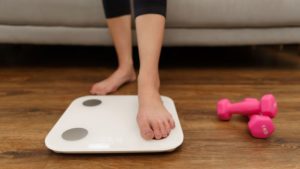
If you snore loudly or sometimes wake up gasping for breath, it is possible that you have obstructive sleep apnea (OSA). You should certainly visit a qualified professional to seek diagnosis and treatment. However, there may also be some things you can do on your own to lessen the severity of your symptoms. Here are some home remedies for sleep apnea that might just help you get the rejuvenating rest you deserve:
Manage Your Weight
OSA can afflict people of any size or body composition. However, it does tend to occur more frequently in those who carry extra fat around their abdomen or neck. Many people have found that even modest weight loss results in a reduction of their OSA symptoms. A balanced eating and exercise plan may help you to slim down a bit.
Stay Active
Due to genetics or other factors, weight loss is extremely challenging for some individuals. The good news is that exercise on its own, even without weight loss, may reduce sleep apnea symptoms. Try to engage in 150 minutes of moderate cardiovascular activity each week. It would also be beneficial to try strength training two or three times each week.
Change Your Sleep Position
If you sleep on your back, gravity may be working against you. It can tug on the tissues in your airway, making them more likely to obstruct your breathing. If you sleep on your side, however, you may find that you enjoy higher-quality sleep. Another option is to sleep at a slight incline; some people enjoy better rest when they sleep in a recliner instead of a regular bed.
Create a Comfortable Sleeping Environment
Your bedroom should be an environment that is conducive to good sleep. For example, people tend to sleep best at temperatures between 60 and 67 degrees Fahrenheit, so you may want to consider adjusting your thermostat. You should also be sure that you have a comfortable mattress. Additionally, your room should be clean; dust and other allergens might worsen breathing problems during sleep.
Avoid Smoking
Smoking can irritate your airway, causing inflammation and making it more likely that you will experience snoring and other breathing problems during sleep. If you smoke, you should certainly make every effort to kick the habit!
Watch Your Alcohol and Caffeine Intake
Overconsumption of caffeine can make it more difficult to fall asleep, and it can interfere with the quality of your sleep as well. Try to have your last cup of coffee before noon.
Also, keep in mind that alcohol can cause the muscles throughout your body to relax, including the ones in your airway. Therefore, you may be more prone to breathing difficulties. If you choose to drink, you should stop 3 – 4 hours before bedtime.
Meet the Practice
Dr. Jay A. Nelson is a Diplomate of the American Board of Dental Sleep Medicine. He specializes in helping patients conquer their sleep apnea through oral appliance therapy. If you suspect you have a sleep disorder and would like to learn about your treatment options, Dr. Nelson and our team are eager to serve you. Contact our Wesley Chapel office at 813-733-4169.
